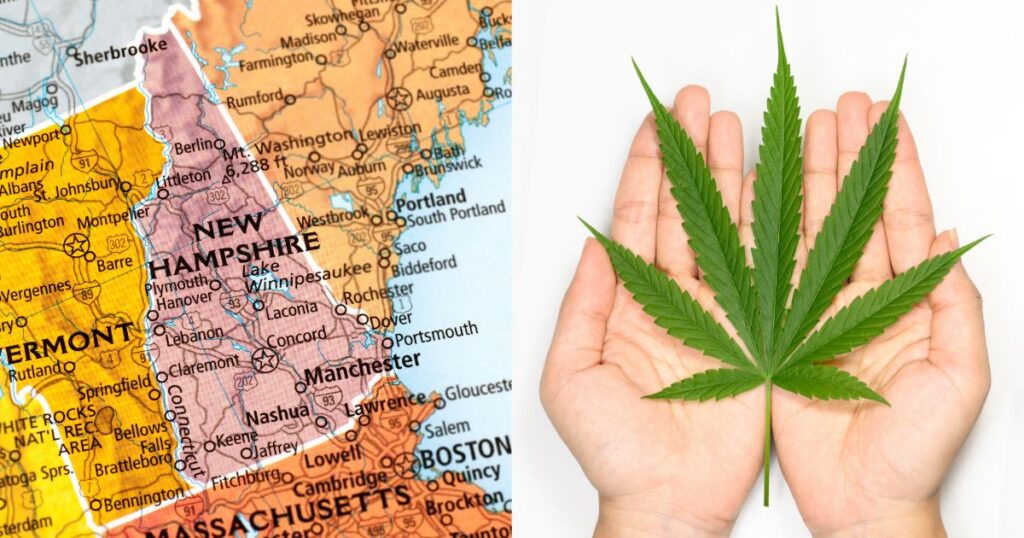Cannabis legalization has remained a prominent issue across the U.S., and New Hampshire is no exception. The introduction of HB 198 marks a moment in the state’s legislative landscape. On the surface, the bill seems to promise progress by legalizing the possession of cannabis for personal use, aligning New Hampshire with its pro-legalization neighbors. However, a deeper look reveals some areas of concern.
What Would HB 198 Do?
The core function of HB 198 is to legalize the possession and use of cannabis for adults aged 21 or older. Specifically, the bill permits the possession of up to two ounces of cannabis flower, 10 grams of cannabis concentrate, and cannabis products containing no more than 2,000 milligrams of THC. This is undoubtedly a step forward for personal freedom and the movement to decriminalize cannabis, offering a legal framework that removes penalties for simple possession within specific limits.
Beyond legalization, the bill includes certain restrictions. For example, it imposes a complete ban on the public consumption of cannabis, including both smoking and vaping. Violating these restrictions would carry penalties ranging from fines to potential misdemeanor charges for repeat offenses. While the intent to prevent public disturbances is understandable, specific provisions, such as penalties for vaping cannabis in public, have sparked debate.
Public Consumption Restrictions Are a Double-Edged Sword
One of the most contentious aspects of HB 198 is the treatment of public consumption. On one hand, prohibiting the smoking of cannabis in public spaces parallels existing restrictions on smoking tobacco in certain areas. On the other hand, vaping cannabis in public is treated with equal severity under the bill, a decision that raises questions about fairness and practicality.
Critics argue that imposing penalties on vaping cannabis in public is disproportionate and largely unnecessary. Unlike smoking, vaping produces minimal odor and is significantly less noticeable. For example, distinguishing a cannabis vape from a nicotine vape in a fleeting encounter on the street or in a park is almost impossible. The punitive treatment of vaping seems out of step with the normalization of similar activities like vaping nicotine or consuming alcohol in designated public settings.
Rather than imposing strict penalties, the approach could benefit from nuanced regulations that reflect the reduced impact and public nuisance of vaping compared to smoking cannabis.
What Do People in New Hampshire Think About Cannabis Legalization?
Public sentiment plays a crucial role in shaping legislation, and a recent survey conducted by the University of New Hampshire’s Granite State Poll reveals overwhelming support for the legalization of cannabis. According to the poll, 70% of New Hampshire residents strongly (49%) or somewhat (20%) approve of legalizing the possession of small amounts of marijuana for personal use. This support spans across party lines, with 84% of Democrats, 72% of Independents, and even 55% of Republicans expressing approval in the poll.
This data suggests that the legalization movement reflects the will of the majority. However, public opinion also underscores the nuanced views residents hold on matters of public consumption. Most Granite Staters support legalization but might draw the line when cannabis consumption interferes with others’ experiences in shared public spaces.
The Bigger Picture Surrounding HB 198
From a larger perspective, HB 198 is a step toward addressing the contradictions in New Hampshire’s cannabis policy. Among its neighboring states, New Hampshire stands as an outlier by not fully legalizing recreational cannabis. Vermont, Massachusetts, and Maine have all legalized marijuana, leaving New Hampshire residents to cross state borders for marijuana products. By passing HB 198, the state could reduce unnecessary arrests, cut legal costs associated with minor possession offenses, and set a foundation for future discussions about a regulated market.
But HB 198 avoids tackling commercial sales, tax structures, or regulatory systems, areas that often spark contention among lawmakers during legalization efforts. The bill focuses solely on decriminalization and personal possession, leaving the issue of creating a formal cannabis industry off the table for now.
This laser focus is likely strategic, considering that more comprehensive cannabis reforms (like those proposing regulated commercial sales) encountered resistance in New Hampshire’s legislature in prior years. By avoiding industry regulations, HB 198 may garner more support from lawmakers who are wary of introducing large-scale structural changes all at once.
Balancing Progress and Oversight
While HB 198 contains broad strokes of progress, the ban on public vaping indicates room for improvement. Politicians must recognize that treating vaping and smoking identically limits the practicality of implementation and penalizes behavior that has far less community impact. While clear, enforceable public usage rules are important, creating them with a deeper understanding of the differences between various forms of consumption would ensure fairer outcomes.
Policymakers should also consider how New Hampshire can best position itself to compete regionally in cannabis-related tourism, tax revenue opportunities, and economic benefits. Simply legalizing cannabis for personal use may fall short of maximizing these opportunities, but it does provide a key starting point.
What’s Next for New Hampshire HB 198?
The path forward for HB 198 remains up in the air. Although it passed the New Hampshire House of Representatives earlier this year, its fate in the Senate is not guaranteed. The Senate is still set to consider the measure on Thursday and could pass it, despite the Senate Judiciary Committee previously recommending that the proposal be rejected. Advocates for legalization face resistance from some lawmakers and from public officials like Governor Kelly Ayotte, who has stated her opposition to recreational cannabis.
That said, the citizen support clearly demonstrated in polls like the Granite State Poll suggests that failing to pass even a basic legalization measure like HB 198 risks political repercussions. New Hampshire’s “Live Free or Die” mantra clashes with its current marijuana policies, particularly when bounded by pro-cannabis states on all sides.
HB 198 is undeniably a step in the right direction for cannabis reform in New Hampshire. Legalizing marijuana possession for adults aged 21 and older could eliminate unnecessary criminalization and align the state with the preferences of most Granite Staters.
Lawmakers must strive to balance regulation with fairness, enabling penalties truly reflect the severity of the offense. Addressing these concerns now will pave the way for smoother negotiations when the time comes to introduce larger marijuana regulations, such as establishing a taxed, commercial market.
Granite Staters deserve thoughtful cannabis reforms that reflect both practicality and public support. With HB 198, New Hampshire has the opportunity to modernize its approach and close the legalization gap with its neighbors while safeguarding individual freedom.
















